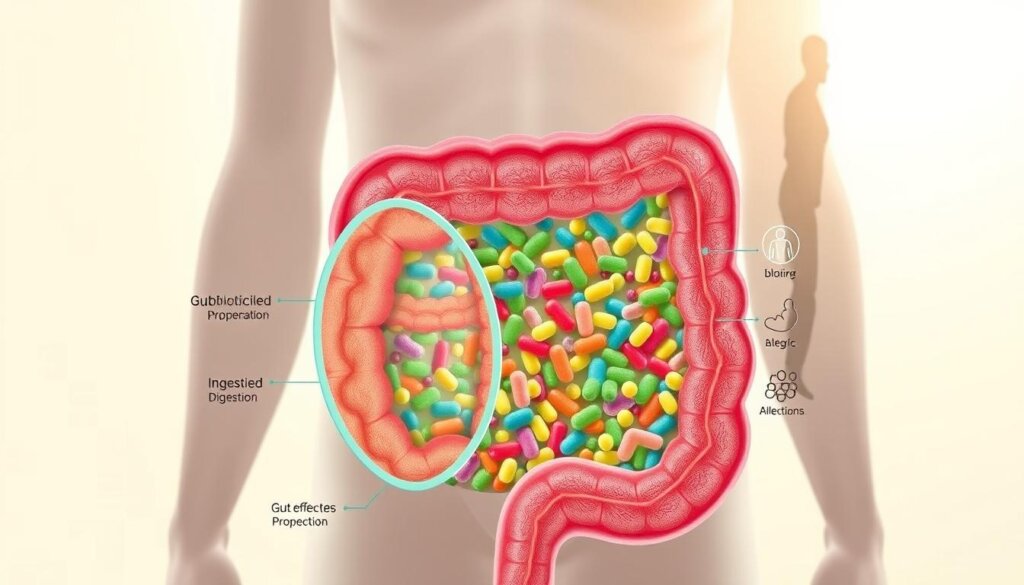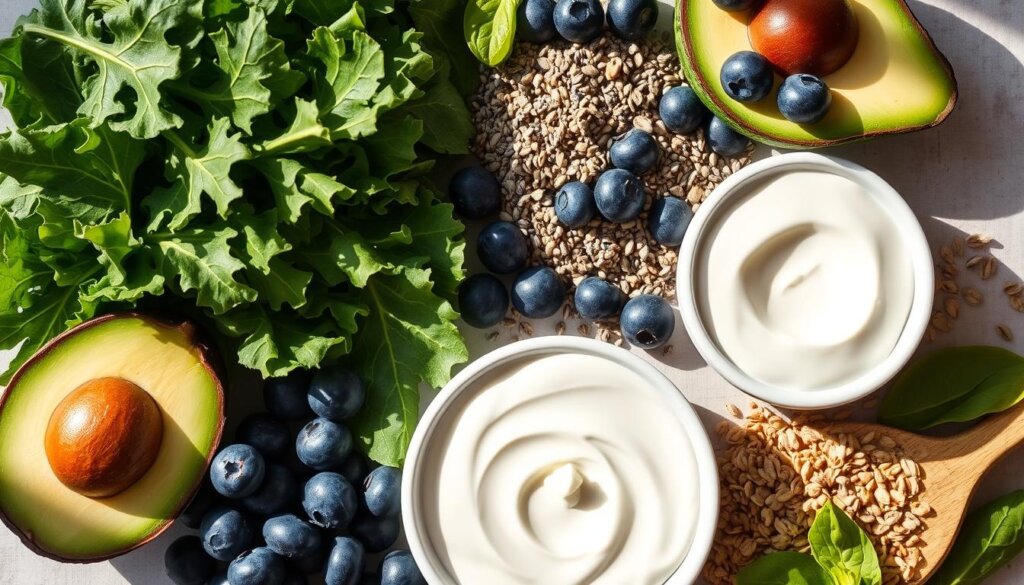Did you know your gut houses over 40 trillion microorganisms that influence everything from immunity to mood? For Malaysians navigating crowded pharmacy shelves, choosing between probiotics and fiber supplements often feels overwhelming. With digestive issues affecting 1 in 3 adults nationwide, understanding these options matters more than ever.
Recent studies reveal probiotics support immune function by balancing gut bacteria, while fiber fuels digestion naturally. But how do they differ? Which aligns with your wellness goals? This guide breaks down their unique roles in digestive health, backed by science and practical advice.
We’ll explore how probiotics introduce beneficial bacteria and fiber acts as a prebiotic. You’ll discover their distinct benefits, from reducing bloating to improving nutrient absorption. Whether managing occasional discomfort or boosting long-term health, clarity awaits.
Key Takeaways
- Probiotics add beneficial bacteria, while fiber feeds existing gut microbes
- Both support digestive health through different biological mechanisms
- Individual needs determine which supplement works best
- Combination approaches often yield optimal results
- Always consult healthcare providers before starting new regimens
Understanding Gut Health: Probiotics and Fiber
Your digestive system operates like a bustling ecosystem, teeming with trillions of microorganisms that shape your well-being. Balancing these microbial communities requires two key players: probiotics and fiber. While both support gut health, they work through entirely different mechanisms.
What Are Probiotics?

Click to LEARN MORE
Probiotics are live beneficial bacteria that reinforce your gut’s natural defenses. Strains like Lactobacillus acidophilus and Bifidobacterium longum help maintain microbial balance, particularly useful after antibiotic use or digestive distress. Research shows specific strains target issues like bloating – learn about the best probiotic for bloating in our detailed guide.
Defining Fiber and Its Role
Fiber acts as fuel for your existing gut bacteria, helping them produce essential nutrients. Unlike probiotics, it doesn’t introduce new microbes but nourishes beneficial ones already present. This prebiotic effect makes whole grains, fruits, and vegetables crucial for long-term digestive harmony.
| Feature | Probiotics | Fiber |
|---|---|---|
| Primary Action | Add new bacteria | Feed existing bacteria |
| Key Components | Live microorganisms | Plant-based carbohydrates |
| Common Sources | Yogurt, supplements | Oats, bananas, legumes |
While probiotics provide immediate microbial support, fiber creates sustainable conditions for gut health. Many nutrition experts recommend combining both approaches for optimal results.
Comparing Benefits and Drawbacks
Navigating the world of gut health supplements requires understanding both their strengths and limitations. While these products offer targeted support, their effectiveness depends on individual biology and existing conditions.

Digestive and Immune Health Impacts
Probiotics deliver live microorganisms that interact directly with your gut environment. Studies show certain strains strengthen immune responses by crowding out harmful pathogens. A 2022 review found diverse gut bacteria populations correlate with better metabolic health and weight management.
These beneficial microbes also produce compounds like short-chain fatty acids. These substances nourish colon cells and may influence mood regulation. Research from 2019 suggests this gut-brain connection could explain reduced anxiety symptoms in some users.
Potential Side Effects and Considerations
Not everyone experiences smooth results. Temporary bloating or gas often occurs as the stomach adjusts to new bacterial strains. Those with IBS or SIBO might face aggravated symptoms due to microbiome shifts.
Healthcare professionals caution against self-prescribing. Immunocompromised individuals and pregnant women should consult doctors before using specific probiotic strains. While supplements provide concentrated doses, established bacterial colonies naturally resist newcomers – making consistent use crucial for lasting effects.
Is it better to take a probiotic or fiber supplement?
Behind the marketing claims lies a landscape shaped by clinical studies and microbiologists. The American Gastroenterological Association analyzed 280 trials and found microbial supplements only effective for three conditions: preventing antibiotic-related C. difficile infections, reducing preterm infant colon inflammation, and managing pouchitis.
Scientific Evidence and Research Insights
A 2023 systematic review revealed most probiotic products lack robust proof for common digestive claims. While these supplements contain up to 80 billion bacteria, they represent less than 0.08% of your gut’s microbial population. Unique microbiome compositions mean identical strains produce different effects across individuals.
| Aspect | Probiotic Supplements | Fiber Supplements |
|---|---|---|
| Clinically Proven Uses | 3 specific conditions | Broad digestive support |
| Microbial Impact | Temporary colonization | Sustained prebiotic effect |
| Regulatory Status | Limited FDA approvals | Generally recognized as safe |
| Personalization Needs | High (strain-specific) | Low (dose-dependent) |
Expert Opinions on Supplement Use
Dr. Suzanne Devkota, a leading microbiome researcher, notes:
“Many microbial products operate on hope rather than evidence—you’re essentially conducting an unsupervised experiment on your gut.”
Studies show fiber consistently supports digestive health through measurable mechanisms like stool bulk and SCFA production. For immunity or mental health claims linked to probiotics, research remains inconclusive across 78% of published papers.
Healthcare professionals emphasize consulting specialists before starting regimens. While some microbial supplements show promise, dietary fiber offers more predictable benefits for most Malaysians seeking gut health improvements.
Optimizing Your Diet with Probiotics and Fiber
Building a microbiome-friendly diet doesn’t require exotic ingredients—just strategic selections. Everyday choices can transform meals into powerful tools for gut health when combining probiotic and prebiotic foods. Let’s explore practical ways to nourish your digestive ecosystem through accessible, flavorful options.

Smart Food Pairings for Gut Support

Click to LEARN MORE
Whole grains like oats and quinoa deliver prebiotic fibers that feed beneficial bacteria. These complex carbohydrates create lasting fuel for microbial communities while adding texture to meals. For Malaysian food lovers, swapping white rice for brown rice in nasi lemak offers an easy upgrade.
Fermented foods serve dual purposes as natural synbiotics. Unpasteurized kimchi and tempeh provide live cultures alongside fiber-rich vegetables. Nutritionists recommend checking labels for “live and active cultures” to ensure probiotic benefits survive processing.
- Bananas and berries boost soluble fiber intake while sweetening breakfasts
- Garlic and onions add prebiotic compounds to stir-fries and curries
- Legumes like chickpeas in kurma dishes increase resistant starch content
A 2023 study found people eating 30+ plant varieties weekly had more diverse gut microbiomes. This doesn’t mean drastic changes—simply rotating through local fruits like cempedak, mangosteen, and guava adds natural variety. As gut health researcher Dr. Lim Wei Chen notes:
“Food synergy often outperforms supplements because nutrients work together in ways we’re still discovering.”
For sustained benefits, combine probiotic-rich foods like yogurt with prebiotic sources. Try topping oatmeal with kefir and sliced bananas, or add sauerkraut to whole-grain sandwiches. These pairings help beneficial bacteria thrive while aligning with Malaysia’s vibrant food culture.
The Synergy of Prebiotics, Probiotics, and Fiber
Your gut thrives on teamwork between living microbes and plant fibers. When combined strategically, these elements create a self-reinforcing cycle that supports digestive resilience. Let’s explore how their partnership works—and why it matters for Malaysians seeking lasting wellness.
Understanding Synbiotics
Synbiotics merge probiotics with prebiotic fibers in one powerful package. Fermented foods like kefir and kimchi naturally contain both components—live cultures feed on the fiber present in cabbage or milk. This synergy allows beneficial bacteria to multiply effectively within your gut environment.
Research highlights how prebiotic fibers transform into butyrate during digestion. This short-chain fatty acid fuels colon cells and reduces inflammation. As Dr. Aminah Yusof from Universiti Putra Malaysia notes:
“Without adequate fiber intake, even the best probiotic strains struggle to establish colonies long-term.”
Balancing Your Gut Flora Naturally
Diverse fiber sources create ideal conditions for microbial diversity. Try these local-friendly combinations:
- Brown rice congee topped with pickled vegetables
- Overnight oats with yogurt and sliced mango
- Stir-fried tempeh with garlic and bok choy
Different types of fibers from grains, fruits, and legumes feed distinct bacterial species. Rotating through options like oats, bananas, and lentils ensures comprehensive support for your gut microbiota. This approach often yields more stable results than standalone supplements.
Wellness Group Malaysia: Contact and Business Information
Ready to boost your digestive wellness? Wellness Group Malaysia offers personalized guidance for incorporating probiotics and prebiotics into daily routines. Their team helps clients select quality supplements while emphasizing natural food sources.
Business Hours and Location Details
Visit their Kuala Lumpur center Monday-Friday (9:30 AM-6:30 PM) or weekends (10 AM-5 PM). Conveniently located near public transit, the facility provides consultations on gut health strategies tailored to Malaysian lifestyles.
WhatsApp Support: +60123822655
Get instant answers about supplements and dietary adjustments through their dedicated chat line. The nutrition team explains how different fiber types interact with probiotic strains, helping you make informed choices.
Wellness Group combines scientific research with practical advice to ensure content aligns with individual health goals. Whether optimizing digestion or enhancing nutrient absorption, their experts simplify complex microbiome science into actionable steps.
FAQ
How do probiotics and fiber differ in supporting digestion?
Probiotics introduce live beneficial bacteria to the gut, aiding digestion and balancing microbiota. Fiber, particularly prebiotic types, feeds existing gut bacteria, promoting their growth. Both work together but serve distinct roles in digestive health.
Can supplements replace fiber-rich foods like whole grains and fruits?
While supplements help fill gaps, whole foods offer vitamins, minerals, and antioxidants missing in isolated forms. For example, oats and apples provide soluble fiber alongside nutrients that support overall wellness. A varied diet remains ideal for long-term gut health.
What are common side effects of increasing fiber or probiotic intake?
Rapid changes may cause bloating or irregular bowel movements. Gradually adding fiber-rich vegetables or fermented foods like kimchi allows the gut to adjust. Those with irritable bowel syndrome should consult a healthcare provider before major dietary shifts.
Are synbiotics more effective than taking probiotics alone?
Synbiotics combine probiotics and prebiotics, creating synergy to enhance microbial survival in the gut. Research suggests they may improve outcomes for conditions like irritable bowel syndrome compared to standalone supplements, but individual needs vary.
How does Wellness Group Malaysia assist with personalized gut health plans?
Wellness Group Malaysia offers consultations via WhatsApp at +60123822655, providing tailored advice on integrating fermented foods, fiber sources, and supplements. Their experts emphasize evidence-based strategies to optimize digestive and immune health.
Do probiotics impact mental health through gut-brain connections?
Emerging studies link balanced gut microbiota to reduced anxiety and improved mood. Certain strains, like Lactobacillus rhamnosus, may influence neurotransmitter production. However, results depend on diet quality and consistent probiotic intake from yogurt or supplements.
Which foods naturally combine prebiotics and probiotics?
Fermented foods like kefir and sauerkraut contain live cultures (probiotics) alongside fiber (prebiotics). Garlic, onions, and bananas also pair well with probiotic-rich options, fostering a diverse gut environment without relying solely on supplements.






